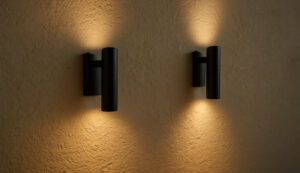Selecting the ideal parking lot poles goes beyond mere aesthetics; it’s a crucial decision that affects your parking area’s safety, efficiency, and overall functionality. Whether you’re illuminating a compact parking space for a quaint store or a vast area for a busy shopping center, we’re here to assist you. Let’s transform that dim, intimidating parking lot into a well-lit, inviting space.
The Shape of Parking Lot Lighting Poles
This parking lot pole light pole selection guide dives into the essentials of choosing the ideal parking lot light pole, focusing on the shape of the poles and comparing round and square options.
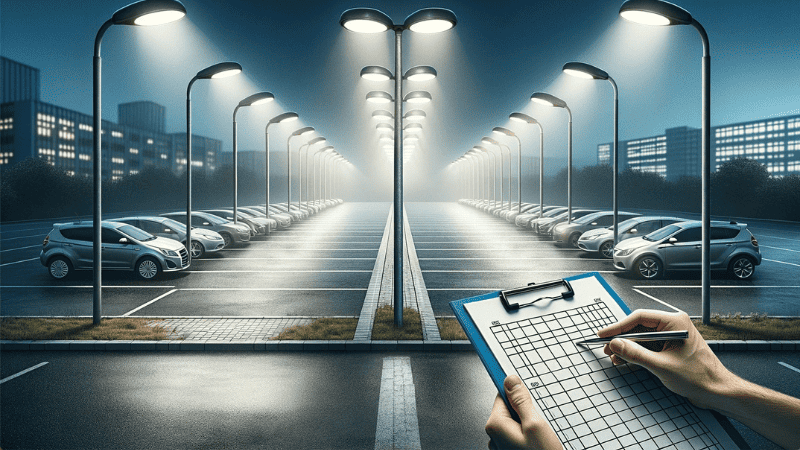
1. Round Poles
Round poles are a common choice for parking lot lighting. They offer a sleek and streamlined appearance, which can contribute to the overall aesthetics of the space. These poles are often made from durable materials like steel or aluminum, ensuring longevity and resistance to weather conditions.
Benefits:
- Aesthetic Appeal: The smooth, circular design of round poles offers a modern and discreet look.
- Wind Resistance: Due to their shape, round poles are more aerodynamic and can withstand windy conditions better than square poles, ensuring structural integrity.
Disadvantages:
- Limited Mounting Options: The curved surface of round poles may limit the mounting options for lighting fixtures and other accessories.
2. Square Poles
Square poles provide a robust and sturdy option for parking lot lighting. They have flat surfaces on all four sides, facilitating easier light and accessories mounting.
Benefits:
- Versatility in Mounting: The flat surfaces of square poles allow for more fixture mounting options, making them highly versatile.
- Strength and Durability: Square poles are known for their strength, making them reliable for supporting heavy lighting fixtures and ensuring maximum weight support.
Disadvantages:
- Aesthetic Considerations: Square poles might have a more industrial look, which may not blend seamlessly into all environments like round poles.
- Wind Resistance: The flat surfaces of square poles can catch more wind, potentially making them less stable in extremely windy conditions than round poles, which is a crucial factor in parking lot lighting design.
Considering these factors, you can decide on the most suitable light pole for your parking lot, ensuring optimal illumination and low maintenance while considering aesthetic appeal and wind resistance.
Ask For Free Quote
Let us Respond Promptly for your Needs :)
Different Materials for Parking Lot Lighting Poles
Several options are available, with steel, aluminum, and concrete being the most common materials. These materials have unique qualities and strengths, making them suitable for specific situations.
1. Steel Light Poles
Steel light poles are popular for parking lot lighting due to their durability and strength. They are known for their robust construction, capable of withstanding harsh weather conditions, such as strong winds and heavy snowfall.
These poles are often galvanized to prevent rust and corrosion, ensuring a longer lifespan. Steel poles are a reliable option when you need to support heavy fixtures and require a long-term lighting solution. They are commonly used in areas prone to extreme weather or high-traffic locations.
2. Aluminum Light Poles
Aluminum light poles offer a lightweight and corrosion-resistant alternative to steel. They are an excellent choice in coastal areas or regions with high humidity, as aluminum does not rust. These poles are easy to install because they are lightweight, making the installation process more manageable.
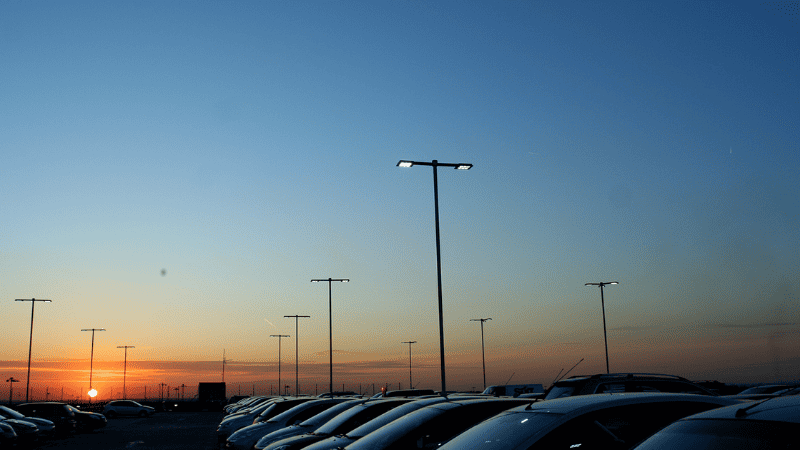
However, aluminum may not be as sturdy as steel and may not be the best option for areas with a high risk of vehicular accidents or extreme weather. Where aesthetics play a significant role, aluminum poles often come in various styles and colors, offering a more visually appealing lighting solution.
3. Concrete Poles
Concrete light poles are known for their incredible strength and stability. They are an ideal choice for situations where safety and longevity are paramount. Concrete poles can withstand impacts from vehicles, making them suitable for busy parking lots or areas where collisions are a concern. They are also highly resistant to vandalism and theft.
While concrete poles are durable, they may not be as versatile in design and are typically used in applications where strength and longevity are the primary considerations.
How to Select the best Parking Lot Light Pole?
Choosing the right parking lot light pole is a crucial decision that impacts the safety, functionality, and aesthetics of your outdoor space.
1. Height
Height, size, layout, and glare mitigation are crucial factors in choosing the ideal height for parking lot light poles. Local regulations often dictate maximum allowable heights, ensuring safety and aesthetic consistency. In bustling urban areas, shorter poles help minimize glare, though they may require greater numbers for adequate coverage.
In contrast, rural settings may benefit from taller poles, providing uniform light distribution with less concern for glare due to fewer pedestrians. Lighting designers utilize specific tools and ratings to manage glare, ensuring a comfortable and safe lighting environment within property boundaries.
2. Base and Adapter
When selecting the right parking lot light pole, don’t overlook the critical role of the base and adapter. The base serves as the foundation and support for the pole while also needing to adapt to the specific light pole design.
Before delving into materials and other factors, ensure compatibility between the chosen light pole and the base to avoid potential complications and unnecessary expenses. Remember that the base and the pole, typically made of materials like steel, can be prone to corrosion and rust, requiring maintenance over time.
Ask For Free Quote
Let us Respond Promptly for your Needs :)
3. Costs Associated with Parking Lot Lighting Poles
Let’s break down these expenses to give you a clear understanding of what to expect.
Package Fees
Package fees are the costs of purchasing the lighting poles, including the poles and any additional components or features you require. These fees can vary depending on the type of lighting system you choose.
For instance, if you opt for a solar-powered unit, the package fee may range from $500 to $2500 or more, depending on the specific features and capabilities of the solar unit. Similarly, if you choose an AC-powered lighting system, the package fee could be in the same price range as a solar unit light pole.
Installation Fees
The installation cost of parking lot light poles can be influenced by various factors, with one of the most significant being the nature of your project. On average, a parking lot light pole installation costs around $970 and typically takes approximately 13 hours to complete.
However, it’s important to note that the location or size of the installation plays a vital role in determining the overall expense. When electrical cables need to run underground to connect the poles, you can expect the installation cost to increase by a few extra dollars.
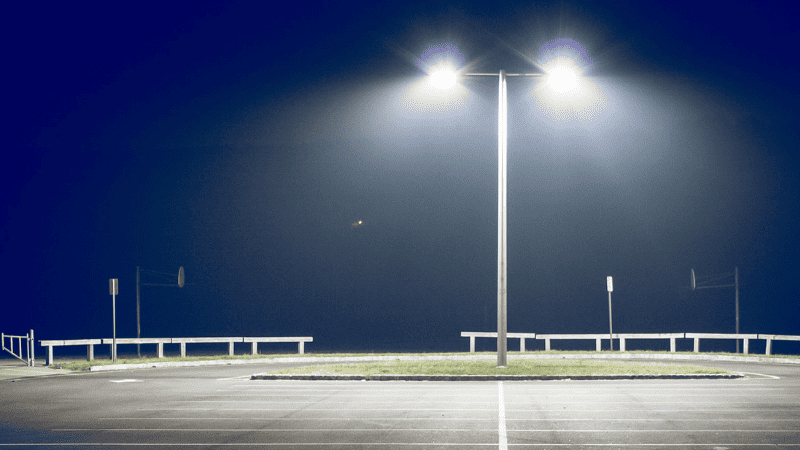
Installation and Maintenance
Proper installation and maintenance are paramount to ensure the longevity and optimal performance of the poles, and it often requires professional assistance.
Installation
- Spacing: Proper spacing between parking lot light poles ensures even light distribution. For example, if you’re illuminating a wide parking space, you’d need poles placed regularly to control glare and provide bright, even lighting.
- Angles and Distribution: The angle at which light fixtures are mounted can determine how well they illuminate the parking lot. Type III distribution, for instance, is generally suited for parking lots as it offers a broader range of light output.
- Foundation and Mount: The installation should ensure the pole’s stability using concrete bases or direct burial methods. The mount, be it slip fit or direct arm, should be suitable for the pole’s material and the weight of the lighting fixtures.
Maintenance
- Material Care: Steel poles might require periodic checks for signs of rust, while aluminum poles benefit from their corrosion resistance. Regular maintenance ensures the pole’s longevity and the parking lot’s safety.
- Light Output and Luminaires: LED lights are popular for parking lot lights due to their bright light output and low maintenance needs. Regular checks ensure they function optimally, providing the necessary illumination for the parking lot.
- Environmental Factors: Depending on the location, factors like wind, rain, and other environmental elements can impact the light pole and fixtures. Regular checks and maintenance can help in the early detection of issues and ensure the lighting project’s success.
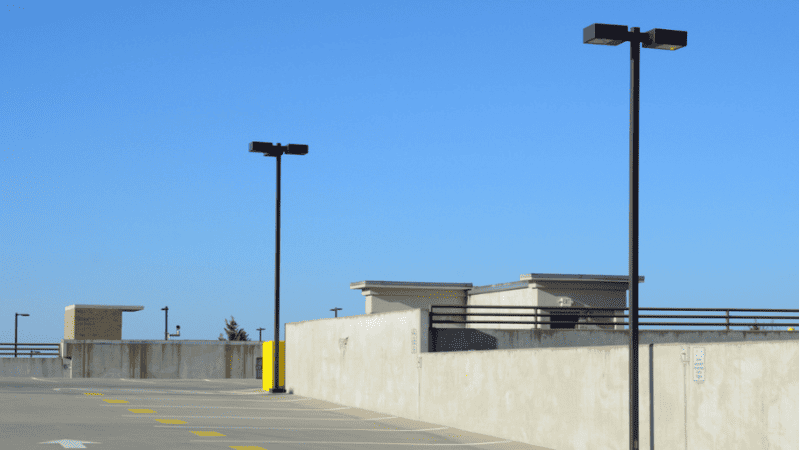
FAQs
1. What Size Light Pole do I Need?
The size of the light pole you need largely depends on the size and requirements of your parking lot. For small parking lots and residential uses, 15-20-foot light poles are recommended, with bulbs of 12,000-18,000 lumens and 20-30 feet spacing between poles. For larger areas, 20-25-foot light poles with bulbs of 20,000-30,000 lumens and 30-40 feet spacing are suitable. For even larger spaces, 25-35 foot “high mast” poles with bulbs of 30,000-70,000 lumens and 40-50 feet spacing are recommended.
2. What Is the Common Parking Lot Light Pole Height?
The common parking lot light pole height can range from 12 ft. to 20 ft. However, in some cases, it can reach as high as 35 ft. The size of the parking lot determines the recommended height of the poles. Larger areas are better suited to taller poles, while smaller areas may require shorter poles.
3. What will Happen If the Pole is too Short or too Tall In the Parking Lot?
If the pole is too short, it may not provide optimal illumination for the entire parking lot, leading to dark spots and reduced visibility, which can be a safety concern. On the other hand, if the pole is too tall, it might cause excessive glare, light pollution, and unwanted light spillage to neighboring properties.
4. How often do We Need to Repair the Parking Lot Pole?
The frequency of repair for parking lot poles depends on the material they are made of and the environmental conditions they are exposed to. For instance, steel poles are durable but can rust and corrode, requiring more frequent maintenance. In contrast, concrete poles have a long lifespan and require minimal maintenance. Aluminum poles are corrosion-resistant and low maintenance.
Conclusion
Opting for the appropriate parking lot light pole is crucial, and RC Lighting offers a reliable range of durable LED lighting solutions tailored for various parking lot needs. Their expertise in architectural LED lighting ensures quality and efficiency, backed by a five-year warranty.
Whether you need steel poles for structural integrity or guidance on mounting height for optimal illumination, RC Lighting provides economical and professional options to enhance your parking lot lighting design.
Illuminate Your World with RC Lighting‘s Exceptional LED Solutions
Step into a world where quality meets innovation with RC Lighting’s exceptional range of LED products. Being a leading architectural LED lighting manufacturer in China, RC Lighting is dedicated to delivering top-notch lighting fixtures that fit well within your budget and time frame. Our vast array of indoor and outdoor LED solutions is tailored to meet diverse needs, whether you’re looking for custom-made lights or standard models.
With RC Lighting, you’re not just getting a product, but a guarantee of excellence, durability, and outstanding customer service. Explore our collection today and brighten up your spaces with the unmatched elegance and efficiency of RC Lighting’s LED solutions, Contact us now!

